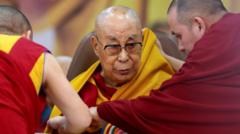**The coming summit marks an opportunity for both leaders to reinforce their joint stance against perceived Western hegemony and promote their vision of a multipolar world order.**
**Putin and Xi Solidify Their Alliance Amid Global Tensions**

**Putin and Xi Solidify Their Alliance Amid Global Tensions**
**Leaders of Russia and China frame their relationship as a bulwark against external pressures, ahead of significant commemorations in Moscow.**
In a significant diplomatic meeting held in Moscow, Russian President Vladimir V. Putin and Chinese President Xi Jinping showcased their respective nations as pillars of stability in an increasingly uncertain global landscape. This meeting took place just a day before the 80th-anniversary celebrations commemorating the Soviet Union's victory over Nazi Germany in World War II—an event laden with historical resonance and national pride.
During the Kremlin talks, both leaders positioned themselves as alternative global powers advocating for a multipolar world, stepping away from Western dominance. Their partnership has grown increasingly important, particularly given President Trump's controversial political maneuvers and erratic foreign policy direction, which have left both Russia and China reassessing their strategies and alliances.
Notably, Trump has failed to engage effectively with either leader since his return to power, leaving discussions on the ongoing war in Ukraine stagnant and leading to intensive trade negotiations set to begin in Switzerland this week with Chinese officials. As Putin welcomed over 25 global leaders, including several authoritarian heads of state, the gathering underscored Russia's shifting diplomatic focus towards non-Western allies.
Amid Russia's growing isolation due to its full-scale invasion of Ukraine, Moscow's reliance on Beijing has intensified. China has become a crucial ally by continuing to purchase Russian oil and providing essential goods to replace those abandoned by Western companies, although it has refrained from overt military involvement in the conflict.
As both countries navigate a precarious international environment and solidify their alliance, the Kremlin aims to leverage their partnership to assert their influence and champion a new world order that challenges established norms. The events in Moscow not only symbolize solidarity between the two nations but also reflect their shared ambition to reshape the global balance of power in their favor.
During the Kremlin talks, both leaders positioned themselves as alternative global powers advocating for a multipolar world, stepping away from Western dominance. Their partnership has grown increasingly important, particularly given President Trump's controversial political maneuvers and erratic foreign policy direction, which have left both Russia and China reassessing their strategies and alliances.
Notably, Trump has failed to engage effectively with either leader since his return to power, leaving discussions on the ongoing war in Ukraine stagnant and leading to intensive trade negotiations set to begin in Switzerland this week with Chinese officials. As Putin welcomed over 25 global leaders, including several authoritarian heads of state, the gathering underscored Russia's shifting diplomatic focus towards non-Western allies.
Amid Russia's growing isolation due to its full-scale invasion of Ukraine, Moscow's reliance on Beijing has intensified. China has become a crucial ally by continuing to purchase Russian oil and providing essential goods to replace those abandoned by Western companies, although it has refrained from overt military involvement in the conflict.
As both countries navigate a precarious international environment and solidify their alliance, the Kremlin aims to leverage their partnership to assert their influence and champion a new world order that challenges established norms. The events in Moscow not only symbolize solidarity between the two nations but also reflect their shared ambition to reshape the global balance of power in their favor.




















